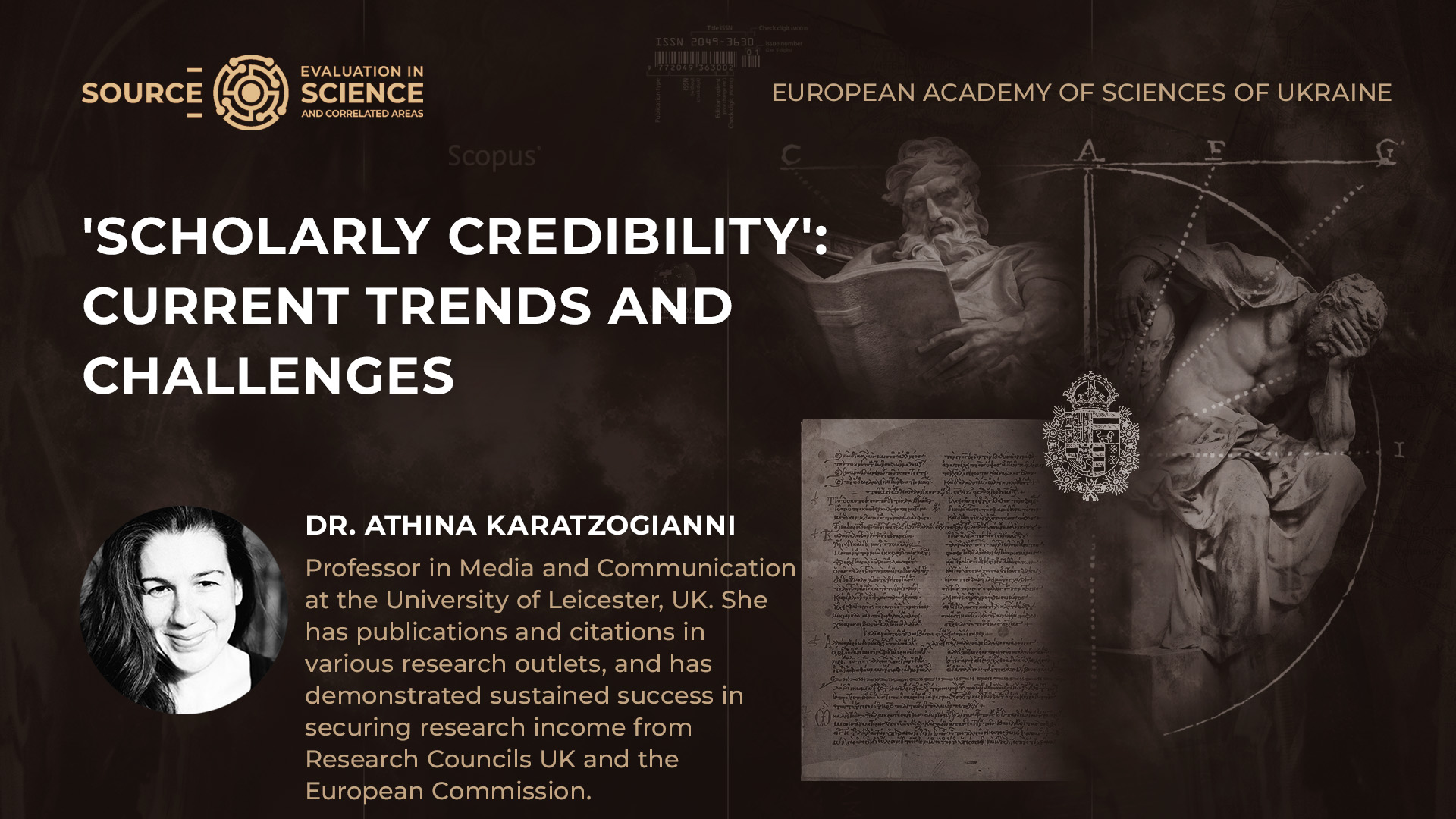‘Scholarly Credibility’: current trends and challenges

Dr. Athina Karatzogianni
Associate Professor in Media and Communication at the University of Leicester, UK
Amicus Plato, sed magis amica veritas
Undoubtfully, many scholars are obliged to conduct researches and participate in various scientific projects in a tremendously competitive environment. The cutthroat competition is the apparent tendency of the 21st century, which has also reached and penetrated academia’s research environments. However, 20 years ago, the situation seemed to be different. The following paper is based on an online panel discussion speech of Prof. Karatzogianni (Professor in Media and Communication at the University of Leicester) at the conference “Challenges of Source Evaluation in Science and Correlated Areas.”
I have faced certain ‘research-settings’ tendencies and realized that my colleagues in the EU experience the same barriers. Today, being under pressure of global competitive circumstances, European scholars do not have a natural opportunity to regulate the speed or terms of implementing their scholarly work. Consequently, these days, scientists tend to have to work very fast, which causes a problem in the way ideas, hypotheses, conclusions, etc., are analyzed, developed, and implemented. The scientific breakthrough’s primary factor is no longer associated with the quality of ideas and their impact but is defined by certain documentation production speed parameters.
That ‘unspoken tendency’ tints the quality of what scholars do. Indeed, there are always specific exceptions, like the result-oriented experts’ attempt to resist ‘the fast and easy’ kind of scholarship. Thus, on the one hand, we should value, first of all, the professional aspect. On the other hand, scientists are forced to compete with a particular ‘McDonaldization’ tendency or a trend that weakens the credibility of scholarly work’s quality and relevance.
A ‘scientist’ as a professional phenomenon appearance is related to the mid-nineteenth century. Before that (Renaissance and Enlightenment Epochs), people of various sorts of professions or expertise were doing what we now note as ‘science’ like G.Galileo or I. Newton; some were priests, for instance. There was no standard classification and criteria for who is the ‘scientist.’ In Ancient Greece, scientific researches were conducted by philosophers.
Now we conceptualize science as a set of rules, laws, principles, and terms of physics, medicine, biology, genetics, economy, etc. For the sake of contrast, the Nobel Prize is awarded within the scope of only five disciplines. The ‘scientist’ today is a much more restricted kind of definition. In retrospect, to the great scientists of all times, we should keep in mind the outstanding scholars and researchers like Albert Einstein, Marie Curie, Ada Lovelace, Nikola Tesla, Isaac Newton and many others. What is fascinating about these people is that they were “confined” to the specific fields classified as STEM fields. STEM stands for science, technology, engineering and mathematics and refers to any subjects that fall under these four disciplines. However, that shapes the other rather alarming tendency amidst the social environment—experts who are involved in social sciences are not recognized as scientists. That sets the cognitive demarcation in the scientific field; humanities require no less effort, power, persistence, and skills.
Nevertheless, these fields’ experts subconsciously have to work harder to focus social and public attention on the original and productive sides of their impact. It would not be a matter of exaggeration; however, we should do our best to demonstrate the validity of the fact that scientists are not just experts who struggle with cancer prevention or COVID19. Scientists are also the no less dedicated professionals who have multiplied the philosophical, sociological, psychological, and ethical heritage of all generations. Moreover, that ‘multiplication effect’ does not presuppose the endless and limitless production of scientific reports and articles within tight deadlines, pursuing technical plans, or compliance with statistical targets.
The other tendency to outline is connected with the fact some experts and researchers contribute more to science than those who call themselves ‘scientists.’ How and in what way, then, to regulate the ‘scientist’ category’s eligibility is an ongoing debate.
Moreover, it is not uncommon for genuinely talented and gifted young people who require special treatment and conditions (in particular those who are autistic or eccentric in a different way) to be excluded from an environment where they could have fulfilled and blossomed their talent and could have become professional scientists in the full sense of the term. If people with special needs are lucky enough and are supported by a global network or specific organizations, engaging with a difference and eccentricity is an outstanding contribution. However, it is usually a matter of luck or probabilities for some amateur scientists courageous to enter the academic context and thrive in the academic context.
If the modern academic context does not tolerate the talent it previously appreciated and praised, in such a case, we are compelled to conclude: we do not tolerate the differences in talent that we as human beings possess. And this form of generalization and abrasion of unique traits is among the crucial reasons for the decline of scholarly credibility and relevance of its impact in contemporary society.
